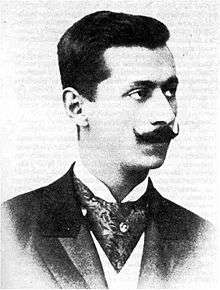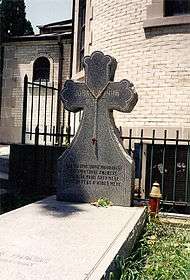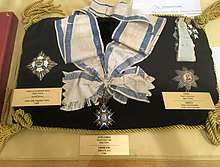Jovan Dučić
| Jovan Dučić | |
|---|---|
 | |
| Born |
17 February 1871 Trebinje, Bosnia Vilayet, Ottoman Empire |
| Died |
7 April 1943 (aged 72) Gary, Indiana, USA |
| Resting place |
Libertyville, Illinois (1943–2000) Trebinje, Bosnia and Herzegovina (since 2000) |
| Occupation | Poet, writer and diplomat |
Jovan Dučić (Serbian Cyrillic: Јован Дучић, pronounced [jǒʋan dûtʃitɕ]; 17 February 1871 – 7 April 1943) was a Bosnian Serb poet, writer and diplomat.
Biography
Jovan Dučić was born on 17 February 1871 in Trebinje, at the time part of Bosnia Vilayet within the Ottoman Empire.
In Trebinje he attended primary school. He moved on to a high school in Mostar and trained to become a teacher in Sombor. He worked as a teacher in several towns before returning to Mostar, where he founded (with writer Svetozar Ćorović and poet Aleksa Šantić) a literary magazine called Zora (Dawn).
Dučić's openly expressed Serbian patriotism caused difficulties with the authorities—at that time Bosnia-Herzegovina was de facto incorporated into the Austro-Hungarian Empire—and he moved abroad to pursue higher studies, mostly in Geneva and Paris. He was awarded a law degree by the University of Geneva and, following his return from abroad, entered Serbian diplomatic service in 1907. Although he had previously expressed opposition to the idea of creating Yugoslavia, he became the new country's first ambassador to Romania (in 1937). He had a distinguished diplomatic career in this capacity, serving in Istanbul, Sofia, Rome, Athens, Cairo, Madrid and Lisbon. Dučić spoke several foreign languages and he is remembered as a distinguished diplomat. His Acta Diplomatica (Diplomatic Letters) was published posthumously in the United States (in 1952) and in the former-Yugoslavia (in 1991).
It was, however, as a poet that Dučić gained his greatest distinctions. He published his first book of poetry in Mostar in 1901 and his second in Belgrade, 1912. He wrote prose as well: several essays and studies about writers, Blago cara Radovana (Tsar Radovan's treasure) and poetry letters from Switzerland, Greece, Spain and other countries.
Like Šantić, Dučić's work was initially heavily influenced by that of Vojislav Ilić, the leading Serbian poet of the late 19th century. His travels abroad helped him to develop his own individual style, in which the Symbolist movement was perhaps the greatest single influence. In his poetry he explored quite new territory that was previously unknown in Serbian poetry. He restricted himself to only two verse styles, the symmetrical dodecasyllable (the Alexandrine) and hendecasyllable—both French in origin—in order to focus on the symbolic meaning of his work. He expressed a double fear, of vulgarity of thought, and vulgarity of expression. He saw the poet as an "office worker and educated craftsman in the hard work of rhyme and rhythm".
Dučić went into exile in the United States in 1941 following the German invasion and occupation of Yugoslavia, where he joined his relative Mihajlo (Michael) in Gary, Indiana. From then until his death two years later, he led a Chicago-based organization, the Serbian National Defense Council (founded by Mihailo Pupin in 1914) which represented the Serbian diaspora in the US. During these two years, he wrote many poems, historical books and newspaper articles espousing Serbian nationalist causes and protesting the mass murder of Serbs by the pro-Nazi Ustaše regime of Croatia.
He died on 7 April 1943, his funeral took place at St. Sava Serbian Orthodox Church in Gary, Indiana and he was buried in the Serbian Orthodox monastery cemetery of Saint Sava in Libertyville, Illinois. He expressed a wish in his will to be buried in his home town of Trebinje, a goal which was finally realized when he was reburied there on 22 October 2000 in the newly built Gračanica church.
Personal life
In the autumn of 1893, on the party in a newly built hotel "Дрина" in Bijeljina, a young and ambitious teacher Dučić meets just finished student of the School of Commerce named Magdalena Živanović. He secretly got engaged with her on 5 November 1893, and their correspondence will continue even after Dučić's departure from Bijeljina and going to Mostar for teaching from 1895 to 1899.
A part of the correspondence is kept safe up to this day, as well as the letter which Dučić's friend and poet Aleksa Šantić redirected to Magdalena on 6 April 1901. year asking for help in collecting a subscription for his songs. Ljiljana Lukić, a retired professor, keeps a personal copy of the correspondence between Dučić and Magdalena.
Professor Ljiljana Lukić states that Dučić lived for a short time in the house of Magdalena Nikolić who lived with her sister. After break up with Dučić, Magdalena shouted that she would never leave home again. "Like a novel heroine, she lived by her memories and the only happy moments she had was in reading the letters and songs of the man she loved", as Professor Lukić concludes. Dučić's secret fiancé left in the amanet the following words to be written after her death on the monument, which are still read today on the Bijeljina graveyard: „Maga Nikolić-Zivanović, 1874–1957, the poet herself and first inspiration of poet Jovan Dučić“.
Twenty years before Magdalena's death, while Dučić was the authorized minister of Kingdom of Yugoslavia, a request was received that testifies of the deep trace which Dučić left in Bijeljina. Singing society "Србадија" asked the minister to help in building a home for the needs of society. "In the first place, in this ideal business, society is free to let you know that it would like and be especially happy, to see your home "Србадија" built up and called the Foundation of the poet Jovan Dučić-Србадија", it is, among other things, in the letter sent 1937 directed to the mister Dučić. Dučić's manuscript is on the margin of the letter and it's written: „He sent a donation of 1000 dinars on 6 December 1937. He begged to call their home inevitably by the name of the great poet Filip Višnjić, their closest countryman".
The Embassy of Serbia in Hungary is in the house which Jovan Dučić received from a Hungarian woman, and then donated it to the state.[1]
Poet of Modernism

Dučić belongs to the Serbian Moderns; he is one of the three outstanding Serbian lyric poets of his generation, namely Aleksa Šantić and Milan Rakić. Coming under the influence of Pushkin and nurtured on his native Serbian folk poetry in Bosnia and Herzegovina, he was at first inclined toward western Romantic modifs: the baroque style, Catholicism, Romaniticism, and particularly toward the society of "the beautiful souls" of the Renaissance. Reminiscent of the ancient poets of Dalmatia, his motifs belong to the Dalmatian aristocratic milieu. Like other Neo-Romantics, Dučić sings of the "far-away princess" (the princesse lointaine of Rostand), who is dying of mortal wounds, far away from her lover. His poetry, which possesses serene beauty, is devoid of any personal note and is, in fact, pure fiction. He walks in the footsteps of Heine and Heredia, evoking "the deep melancholy of the past" and "the scent of things old and vanished."
Whereas all these things become integral in the Western, Catholic and French lyric poets, in Dučić they strike us as a kind of literary exercise and as a heresy against the poet's Serbian Orthodox faith. Consequently, Dučić has often been accused of snobbery and mannerism, and his poetry shows influences of Rodenbach, Maeterlinck, Baudelaire, Verlaine, Albert Samain traces of the Parnassian, Symbolist and Decadent elements, all alien to Serbian traditional poetry. Dučić has shared the illusions of the western poet-princes in the cult of beauty.
Until 1914 Dučić was almost unknown as a poet, although he had already distinguished himself as a courageous political champion of the people of Herzegovina, as co-editor of a Mostar literary review, when he left in 1896 for Geneva to study law.
Dučić's first book of poems was published in Mostar in 1901, while he was still a law student in Geneva. Since that time his complete works in eight volumes have been published in Belgrade many times over. Before we turn to a study of his poetry, brief mention must be made of his poems in prose, Plave legende (Blue Legends), and the travel letters, Gradovi i himere (Cities and Chimeras), whose stylistic superioritry in Serbian prose was recognized by Jovan Skerlić, the eminent Serbian literary critic, shortly before his untimely death in 1914. In the case of Dučić, who is a very sensitive artist with words and an essentially lyric poet, there is no fundamental difference between verse and prose. While his prose poems, Plave legende, for instance, are a logical transition from versification to the lilt of his rhythmic prose, the letters from Geneva, Rome, Madrid, Athens, etc., reveal the sensitive poet for whom a word is the symbol of an inner experience.
As to themes, Dučić is typical of the Moderns and is impressionistic in tone. His experiences are never overwhelming, This fact has already been observed by Skerlić who admits that Dučić's poems possess much elegance, rhythm and finesse, but that this suppression of feelings, the transfiguration of his nature, the wish to be different from other poets, the fear of sincerity and directness, the search for symbols at all costs, the eternal seeking for effects which he achieves with combinations of words and sounds – all these give one an impression of cultivated affectation, of strait-laced elegance, and frequently almost pass into mannerism.
One does not necessarily have to agree with Skerlić, however, this play with his feelings is one of the distinguishing marks of Dučić's poetic nature. Like all the devotees of beauty for beauty's sake, Dučić is also convinced of the great importance of having a measure for beauty. His poetry attempts above all to be disinterested, and consequently it never overcomes the poet.
Dučić has remained faithful to this criterion, and it is for this reason that his inner creative personality is still shrouded in mystery. This is exactly what Skerlić refers to when he speaks of the "suppression of feelings," a quality which has given the remarkable poetry of Dučić its sheen of marble and "the coolness of its shade." Like most symbolists, Dučić is imbued with a particular kind of liturgic expression; he does not come to us with the gestures of a convincing speaker but with the fine figure of a priest.
During Dučić's few final years in the United States were published a monograph, Grof Sava Vladislavić (1942), and Federalizam i Centralizam (1943; Federalism and Centralism), a book of political controversy in which he wanted to draw the West's attention to their continued errors of their ways, especially in foreign policy towards the people of the Balkans.
Legacy

„Jovan Dučić award“ is awarded for achievements in poetry and it is awarded every year during the manifestation "Dučić's Night" in Trebinje.[2]
Orders and decorations
- Member of Serbian Academy of Sciences and Arts
- Order of St. Sava, I class, Kingdom of Yugoslavia
- Order of the Yugoslav Crown, I rank, Kingdom of Yugoslavia
- Order of the Redeemer, II rank, Greece
- Order of the Nile, the great officer rank, Egypt
- Order of the Crown of Italy, the broad sash rank, Kingdom of Italy
- Order of the Star of Romania, I rank, Kingdom of Romania
- Order of the White Lion, the commander cross rank, Czechoslovakia
- Order of Merit of the Kingdom of Hungary, the grand cross rank, Kingdom of Hungary
Works
- Pjesme, knjiga prva, izdanje uredništva Zore u Mostaru, 1901.
- Pesme, Srpska književna zadruga, Kolo XVII, knj. 113. Beograd, 1908.
- Pesme u prozi, Plave legende, pisano u Ženevi 1905. Beograd, 1908.
- Pesme (štampa "Davidović"), Beograd, 1908.
- Pesme, izdanje S. B. Cvijanovića, Beograd, 1911.
- Sabrana dela, Knj. I-V. Biblioteka savremenih jugoslovenskih pisaca, Beograd, Izdavačko preduzeće "Narodna prosveta" (1929–1930). Knj. I Pesme sunca (1929)
- Knj. II Pesme ljubavi i smrti (1929)
- Knj. III Carski soneti (1930)
- Knj. IV Plave legende (1930)
- Knj. V Gradovi i himere (1930)
- Knj. VI Blago cara Radovana: knjiga o sudbini, Beograd, izdanje piščevo, 1932.
- Gradovi i himere, (Putnička pisma), Srpska književna zadruga, Kolo XLII, Knj. 294. Beograd, 1940.
- Federalizam ili centralizam: Istina o “spornom pitanju“ u bivšoj Jugoslaviji, Centralni odbor Srpske narodne odbrane u Americi, Čikago, 1942.
- Jugoslovenska ideologija: istina o “jugoslavizmu“, Centralni odbor Srpske narodne odbrane u Americi, Čikago, 1942.
- Lirika, izdanje piščevo, Pitsburg, 1943.
- Sabrana dela, Knj. X Jedan Srbin diplomat na dvoru Petra Velikog i Katarine I – Grof Sava Vladislavić – Raguzinski, Pitsburg, 1943.
- Sabrana dela, Knj. VII-IX (Odabrane strane). Rukopise odabrali J. Đonović i P. Bubreško. Izdanje Srpske narodne odbrane u Americi, Čikago, 1951.
- Sabrana dela, (uredili Meša Selimović i Živorad Stojković), Svjetlost, Sarajevo, 1969.
- Sabrana dela, (uredili Meša Selimović i Živorad Stojković. Pregledao i dopunio Živorad Stojković), BIGZ, Svjetlost, Prosveta, Beograd-Sarajevo, 1989.
References
- Jovan Skerlić, Istorija Nove Srpske Književnosi (Belgrade, 1921) pages 456–458.
External links
| Serbian Wikisource has original text related to this article: |
- Works by or about Jovan Dučić at Internet Archive
- Works
- Translated works
- Jovan Dučić: Grof Sava Vladislavić
| Wikimedia Commons has media related to Jovan Dučić. |